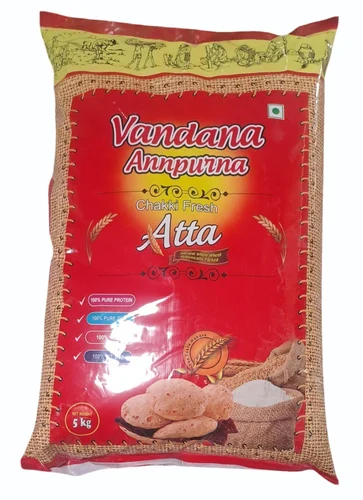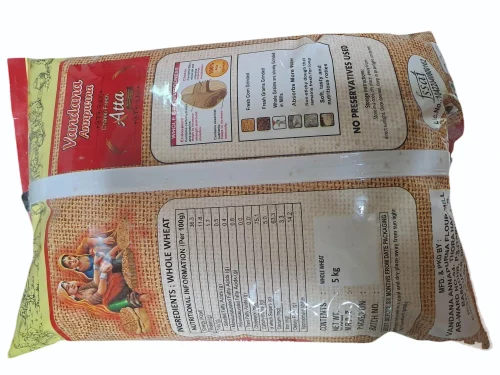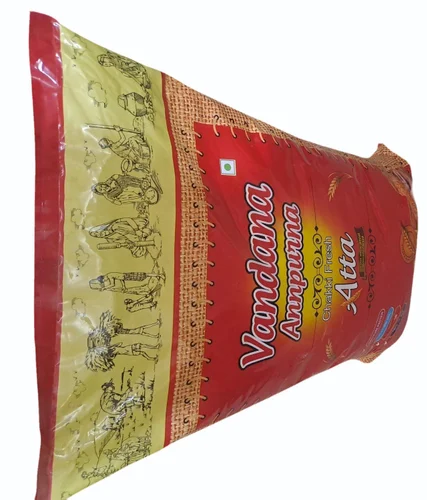5kg Vandana Annpurna Chakki Fresh Atta
₹170.0
| Packaging Size | 5 kg |
| Brand | Vandana Annpurna |
| Packaging Type | Packet |
| Usage/Application | Cooking |
| Type | Chapati Flour |
| Shelf Life | 2 Months |
| Speciality | High in Protein |
| FSSAI No. | 10422040000162 |
- Description
- Additional information
- Reviews (0)
- Q & A
- Sustainability Remark
- More Offers
- Store Policies
- Inquiries
- 100% Pure protein
- 100% Pure zinc
- 100% Iron
- Natural Whole Wheat Hygienically Packed
- 100% Vit b12
- The taste makers
- Endosperm Contains carbohydrates, and proteins Helps to increase strength and Build muscles
- Choker Contains Fibre Minerals And vitamin help to improve metabolism
Whole Grain Goodness
- Fresh Corn Grinded
- Fresh grams grinded
- Whole Grains are slowly grinded
- Absorb More Water
- Non sticky dough that remaind frsh for long soft tasty and nutritious rotis.
- Contains essential nutrients helps to increase immunity
- 100% atta + Choker
NUTRITIONAL INFORMATION(Per 100g)
Energy (kcl) 36.3
Pecten ig 11.8
Fats 1.7
Saturated Fatty Acids (g) 0.5
Monounsaturated Fatty Acids 0.4 Polyunsaturated Fatty Acids (g) 0.8
Trans Fatty Acids (g) 0.0
Cholesterol mg 0.0
Carbohydrates (g) 75.1
of which Sugars (g) 5.0
Calcium (mg) on (mg)63.3
Dietary Fob (g) 14.2
Iron 3.3
| brands | Vandana Annapurna |
|---|
You must be logged in to post a review.
Q & A
Organic products can contribute to sustainability in several ways, but their overall sustainability depends on various factors. Here are some key points to consider:
Environmental Benefits: Organic farming practices typically promote biodiversity, reduce soil erosion, and minimize the use of synthetic pesticides and fertilizers. This can help protect ecosystems, preserve water quality, and reduce pollution compared to conventional agriculture.
Soil Health: Organic farming focuses on improving soil health by implementing practices such as crop rotation, composting, and the use of natural fertilizers. These practices can enhance soil fertility and structure, promoting long-term sustainability and reducing the need for chemical inputs.
Reduced Chemical Exposure: Organic products are grown and processed without the use of synthetic pesticides, herbicides, genetically modified organisms (GMOs), or artificial additives. This reduces the risk of chemical residues in food and can benefit both consumers and farmers.
Energy Consumption: Organic farming often relies on lower energy inputs compared to conventional agriculture, as it emphasizes natural methods rather than relying on synthetic inputs. However, transport and distribution logistics can still contribute to energy consumption and carbon emissions associated with organic products.
Certification Standards: To ensure the integrity of organic products, many countries have established certification programs with specific standards and regulations. These certifications help consumers identify and trust organic products, promoting transparency and accountability within the industry.
Local and Small-scale Production: Organic farming is often associated with smaller-scale and local production systems. This can support local economies, reduce the carbon footprint associated with long-distance transportation, and foster connections between consumers and producers.
Resource Efficiency: Organic farming generally emphasizes resource conservation, including water management, waste reduction, and energy efficiency. However, the efficiency of resource use can vary depending on specific practices employed by individual organic farms.
It's important to note that organic farming is not without challenges. It typically requires more land and labor compared to conventional farming, which can impact scalability and affordability. Additionally, organic yields may be lower in certain cases, leading to potential concerns about global food security.
Overall, organic products can contribute to sustainability by promoting environmentally friendly practices, reducing chemical exposure, and supporting local economies. However, assessing the sustainability of organic products requires a holistic analysis of multiple factors, including production methods, supply chains, and consumer behaviors.
General Inquiries
There are no inquiries yet.





Reviews
There are no reviews yet.